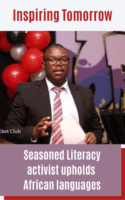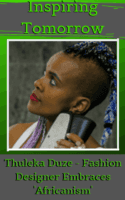This time next month, South Africa will be celebrating literacy month but promoting literacy is Madoda Ndlakuse’s everyday life. Madoda’s passion for telling stories to children in vernac is unmatched and FunDza caught up with him to find where all this passion stems from.
Ndibulele Sotondoshe: Please tell us about who Madoda Ndlakuse is.
Madoda Ndlakuse: I am a father, husband, writer and poet with passion for isiXhosa storytelling. I am originally from Mdantsane but I currently reside in Port Elizabeth. I have worked for Nal’ibali as a Project Co-ordinator in their Uitenhage VW project since 2016. I have been a reading initiatives activist since 2003. Between 2004 and 2011, I was doing poetry workshops for various Eastern Cape communities and high schools. In 2012 I was part of a National Book Week team at Red Location museum conducting slam poetry workshops.
NS: How would you describe your childhood?
MN: My childhood was extremely depressing and hopeless. I was born out of wedlock and did not have an opportunity to be a part of a proper family structure. My illiterate, extremely poor but hustling mother took a decision that I finish my schooling in Port Elizabeth. My mother’s absence and that I did not know who my father caused a whole lot of damage to my wellbeing. I began making friends with books amidst the stress and trauma. I would travel to [different libraries] just to find comfort in expanding knowledge and reading more stories.
NS: When did you realise your love for storytelling?
MN: My Bible Stories book introduced me to the art and the love of storytelling. I was still eight years old then and I was fascinated by the captivating and mind-blowing way the stories were told. The pictures alone were telling great imagination stories that brought joy as I engaged with them. My grandmother was an eloquent speaker so I would listen to her stories when we travelled by foot from our village to another.
NS: And now you tell stories to the little ones.
MN: Yes! Dr Gcina Mhlophe once said, “Tell stories in order to wake up stories in other people.” That is one of the driving forces in making sure that I share more of my stories with children. I enjoy witnessing them acquiring knowledge and confidence. Seeing children expressing themselves in symbolic play, dramatizing their favourite character’s roles and telling their understanding of the whole world is amazing and inspirational. When I tell stories, children use their listening skills which they will need for the rest of their lives.
NS: Why do you tell stories in isiXhosa in particular?
MN: I tell stories in isiXhosa because I feel free and without boundaries in my expressions. My audience connects with me naturally without disturbances. Children learn better when they learn in their mother tongue and research shows that if children learn in their mother tongue it’s easy for them to learn additional languages. Mother tongue stories are so attractive and meaningful to children and they stimulate children to do their best. This translates to children having more interest in writing, storytelling and reading aloud in isiXhosa. My isiXhosa stories have a lot of impact and it is my tool to shift mind-sets and inspire behavioural change.
NS: What would you say has been your greatest achievement?
MN: Representing Nal’ibali and conducting a reading club workshop at the VW Litasa Conference in 2018. Being invited as a storyteller in Durban at the Nozincwadi Storytelling Festival in 2018. For being trusted by Nal’ibali on being one of their voices on radio interviews detailing flagship events like World Read Aloud Day and other literacy development activities.
NS: Where do you see yourself in five years?
MN: I want to help more foundation phase children to be immersed in stories and to be functionally literate in all the schools I work with. To write more moving and inspirational children’s books. To assist in building Izinwe Hub of Excellence ECD in Nelson Mandela Bay. To continue being actively involved in training of teachers through our Funda Leader programme as Nal’ibali and recommend more literacy activists to attend online literacy training through our Funda Sonke Loyalty Programme online. To create powerful online indigenous stories accommodative to every parent with my storyteller daughter Owethu. To help children reach for their dreams through my reading club activism.
NS: Any last words before we go?
MN: Love your neighbour as you love yourself. Life is a process of gathering necessary information about what you want and making the right decisions for yourself. Never ever underestimate the power of stories and you have the final say in choosing the material that you allow your thoughts to digest. Choose who you surround yourself with wisely because today’s poison is not only contained in bottles but it can emerge easily through warm hugs, inboxes and lunch invites.
***
Read about the health worker who recovered from Covid-19 here
Tell us: How do you think that reading can change lives?






